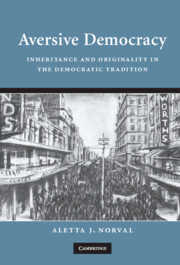Book contents
- Frontmatter
- Contents
- Acknowledgements
- Introduction: towards an aversive account of democracy
- 1 Democracy, universalization and (dis)agreement
- 2 Democratic argumentation: rhetoric and imagination
- 3 Democratic identification and aspect change
- 4 Democratic subjectivity: the promise of democratic community
- 5 Conclusion: aversive democracy – exemplarity, imagination and passion
- Bibliography
- Index
4 - Democratic subjectivity: the promise of democratic community
Published online by Cambridge University Press: 22 September 2009
- Frontmatter
- Contents
- Acknowledgements
- Introduction: towards an aversive account of democracy
- 1 Democracy, universalization and (dis)agreement
- 2 Democratic argumentation: rhetoric and imagination
- 3 Democratic identification and aspect change
- 4 Democratic subjectivity: the promise of democratic community
- 5 Conclusion: aversive democracy – exemplarity, imagination and passion
- Bibliography
- Index
Summary
The price of liberty is our subjection to eternal vigilance.
Democratic theory today needs to address a number of concerns relating to the question of ‘voice’. This, I have suggested, has been treated in two distinctive ways in contemporary democratic theory. For deliberative democrats, it is a matter of equality in the process of deliberation, though, as critics like Sanders have argued, this approach largely ignores the issue of epistemic authority, of who may be heard within the constraints of rational argumentation. In contrast, for post-structuralists, ‘voice’ is thematized precisely from the perspective of those excluded from the polity. The latter approach constitutes an advance over the former. However, its reach is hampered by the sharp division it introduces between ‘the declared political community and the community that defines itself as excluded from this community’. Hence, even as the possibility of the existence of a ‘common stage’ and ‘the existence and status of those present on it’ is at stake here, theoretical effort has gone almost exclusively into thinking about this problem from the point of view of those barred from the domain of the visible. This leaves the terrain of what is called variously ‘the police’, ‘the situation’ and ‘politics’ virtually untouched by the analysis.
- Type
- Chapter
- Information
- Aversive DemocracyInheritance and Originality in the Democratic Tradition, pp. 141 - 186Publisher: Cambridge University PressPrint publication year: 2007



